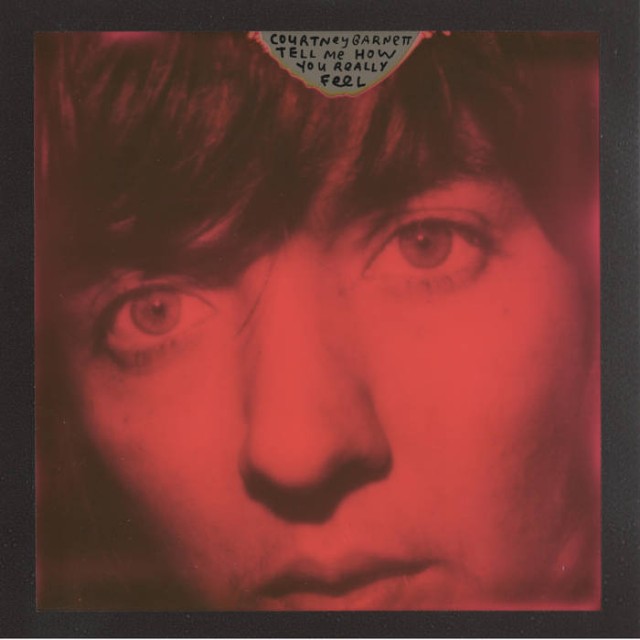To be Courtney Barnett and learn that Liz Phair released the Girly-Sound to Guyville set is like being Bryan Ferry and opening your door to greet a tuxedoed Cary Grant singing “Happy Birthday.” The Australian singer-songwriter depends on a similarly thin rhythm part strummed on her electric guitar, and like Phair on 1993’s galvanic Exile in Guyville, Barnett’s 2015 debut Sometimes I Sit and Think, and Sometimes I Just Sit used chord patterns into whose melodic spaces Barnett poured curt anecdotes about existential trouble and origami—can there be a more dangerous combination?
After last year’s uninhabited Kurt Vile collaboration, she has a second album called Tell Me How You Really Feel that restores confidence in her tunes and the way her guitar lines snake through them. Don’t call it an advance—“progress” in pop music is overrated as benchmark. After all, I enjoy Whipsmart as much as Exile in Guyville. Settle into Tell Me’s crinkled smarts and Barnett remains as observant as Sometimes demonstrated.
The goodwill listeners have extended to Barnett rests to some degree on her talent for writing about characters whose dilemmas are recognizable, not insurmountable—unless the dilemma is finding affordable real estate on a crap salary. Tethered to a fuzz-drenched lick that mimics the din of late afternoon traffic, “City Looks Pretty” turns a jaundiced eye at a metropolis where “everyone’s soaked in animosity” or strangers treat you like a best friend. When she gets home in “Charity” to that overpriced apartment, she deals with a lover whose meditation makes them more strung out. In the album’s jauntiest arrangement, Barnett and her band include stop-start dynamics, a New Order is-that-bass-or-guitar interlude, and Dan Luscombe’s organ on the chorus. “You must be having so much fun / Everything’s amazing,” Barnett sings in a tone that’s far from fun and not quite amazing.
Although the titles suggest an inward turn (“Crippling Self-Doubt and a General Lack of Confidence,” “Walkin’ on Eggshells”), Tell Me uses neuroses as the pegs on which Barnett hangs affirmations of self-reliance; she takes no shit because she’s spent years taking shit. And her band has grown in confidence. When bassist Bones Sloane and drummer Dave Mudie lock into a groove, Barnett can be as nasty as she wants to be: the cowbell on “Help Your Self” announces a tense collection of aphorisms that, the use of the second person notwithstanding, seem self-directed; the loudness of her solo fudges the differences. More convincing as title than song is “I’m Not Your Mother, I’m Not Your Bitch,” where she’s disgusted by a passive lover but much too vituperative about it. She overdoes it; it’s like watching Brad Pitt cry or inventing putdowns on the way home an hour after the argument. Here’s an instance where her guitar wants to go places that Sloane and Mudie won’t or can’t.
At a fleet 37 minutes, Tell Me How You Really Feel may leave fans who assume Major Statements come in the guise of sophomore albums wanting more. What she knows she knows well, and what she doesn’t is beyond her, as it should be—as it is for most of us. In the four-alarm-fire world of social media, though, everyone’s soaked in animosity. Final cut “Sunday Roast” tries damage control. Over tunings that Lou Reed and Sterling Morrison would’ve recognized, and a Mudie beat that Moe Tucker would’ve applauded, Barnett records an afternoon of sometimes sitting and thinking; it’s lethargy under a glass. “It’s all the same to me,” she insists. I don’t believe her. This makes her no worse than anyone else. Tell us how you really feel.





